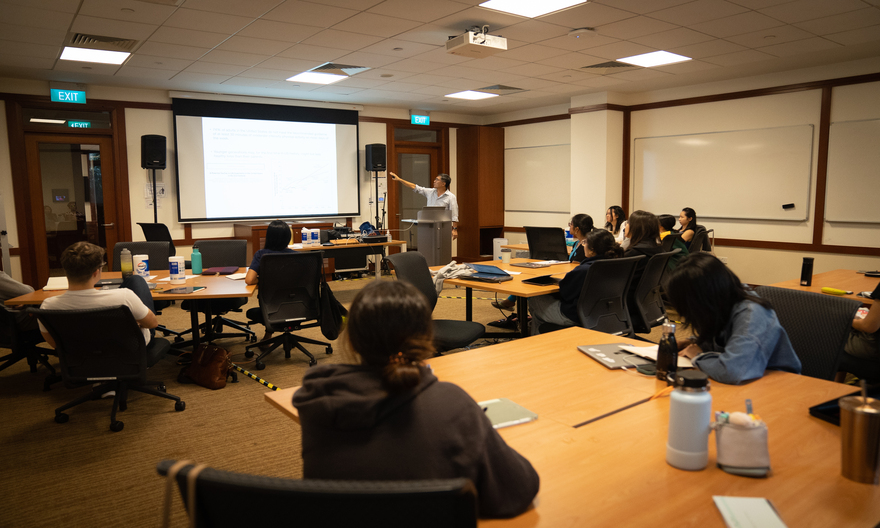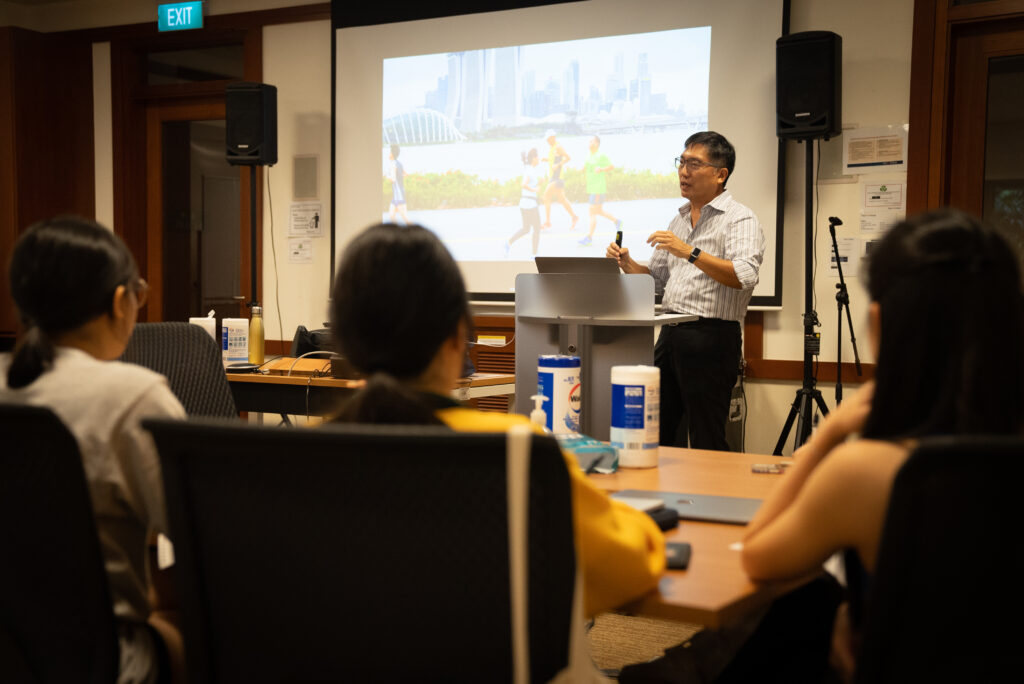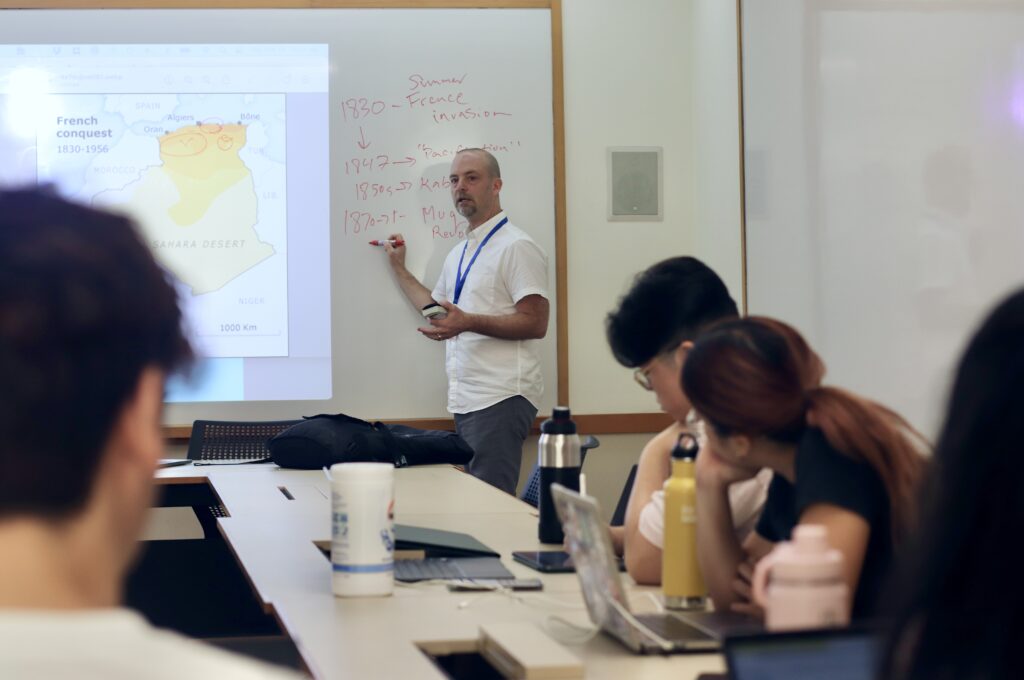A close look at new courses by visiting Yale faculty
Learn more about the Psychology and Global Affairs courses taught by visiting Professor Chun and Associate Professor Wyrtzen from Yale
 Professor Marvin Chun teaching Performance Psychology and Neuroscience. Image by Alan Seah for Yale-NUS College.
Professor Marvin Chun teaching Performance Psychology and Neuroscience. Image by Alan Seah for Yale-NUS College.
Beyond sending students to New Haven on study abroad and research opportunities, Yale-NUS College often hosts visiting faculty members from Yale University. This semester, Visiting Professor Marvin Chun, the Richard M. Colgate Professor of Psychology and Professor of Neuroscience, and Visiting Associate Professor of Sociology, History, and International Affairs Jonathan Wyrtzen are offering new courses that complement the existing Psychology, Life Sciences and Global Affairs course offerings at Yale-NUS College.
Prof Chun is currently teaching Performance Psychology and Neuroscience, a course that was greatly in demand from the get-go: prospective Psychology major Jae Mak (Class of 2025) shared that it was “oversubscribed even from Round 0” and that “a few other sophomores and I only managed to join the class by emailing Professor Marvin Chun directly.”
 Prof Chun giving a lecture on the effects of exercise on performance. Image by Alan Seah for Yale-NUS College.
Prof Chun giving a lecture on the effects of exercise on performance. Image by Alan Seah for Yale-NUS College.
Prof Chun’s lectures and assigned readings expose students to various factors contributing to peak performance, such as the science behind choking, the effects of sleep deprivation, and even how nature may impact cognitive capacity.
A unique feature of the three-hour long seminars is the weekly student presentations on related research findings. These are opportunities for students to not only co-learn and share knowledge, but also apply the concepts learnt about performance psychology within the class structure itself. Jae explained that students are randomly called to present at the start of each seminar.
Jae shared, “While [the students] initially flagged this feature as a source of stress, this was in fact part of Prof Chun’s intended class design — to help us adapt to the performance anxiety that comes with public speaking.” By mid-semester, students were visibly more relaxed, engaging and conversational in their spontaneous presentations.
With this being a new course, Prof Chun is pleased to be developing it with “students [who are] are exceeding my expectations for active engagement, critical thinking, and creative ideas.”
Prof Chun is also supervising several Psychology majors’ senior capstone projects.
Assoc Prof Wyrtzen is offering two Global Affairs major courses at Yale-NUS College this semester: Social Movements in Muslim Societies, and Empire, Nation, and Decolonization.
In Social Movements in Muslim Societies, students are guided to develop a critical familiarity with the current scholarship on social movements and contentious politics. They then apply this conceptual toolkit as a set of lenses to look at a wide range of case studies, stretching from Morocco to Malaysia of activism, mobilisation, and contention. These cases ranged from everyday forms of resistance and protest to full-blown revolutionary waves, such as the 2011 Arab uprisings.
Said Assoc Prof Wyrtzen, “My hope is that students gain a familiarity and understanding of the breadth and depth of activism and contention in Muslim societies and the wide diversity in terms of aims, means, and groups that participate.”
 Assoc Prof Wyrtzen giving a lecture for Empire, Nation, and Decolonization. Image by Desmond Lee for Yale-NUS College.
Assoc Prof Wyrtzen giving a lecture for Empire, Nation, and Decolonization. Image by Desmond Lee for Yale-NUS College.
Assoc Prof Wyrtzen hopes that the course Empire, Nation, and Decolonization can support students in understanding how the present is deeply shaped by the legacies of past empires, decolonisation, and ongoing contentions over the concept of a ‘nation’. Assoc Prof Wyrtzen does so by first equipping students with an understanding of global history from the 18th century, which allows students track long-running struggles over political, legal, economic, and cultural-linguistic rights over the ages.
Oshea Reddy (Class of 2024) who is taking the course this semester appreciated Assoc Prof Wyrtzen’s methodical approach: “We started out by being grounded in the empires that spanned the lands and seas, then moved on to the establishment of nations that pursued colonial projects, to finally approach the end of the semester by considering the process of decolonisation as it unfolded around the world.”
Having taught these courses in a different context, Assoc Prof Wyrtzen enjoys thinking through these same topics from the standpoint of Singapore and Southeast Asia. He commented that this positioning “implicitly and completely inflects the way we think through the course material”.
In fact, he intentionally included more case studies from Southeast Asia for both his courses, contextualising the course content to his Yale-NUS classes which include students who hail from nations that were once colonies.
Said Assoc Prof Wyrtzen, “Overall, I’m really loving the energy, questions, and passions the Yale-NUS students bring to these topics – and I’m learning a tonne myself from them about Singaporean history, identity, and current dynamics here and in the region.”
Yale-NUS College’s close relationship with Yale University opens a multitude of opportunities for our students to engage with a range of distinguished faculty. The courses by the visiting professors have proven to be a fruitful endeavour for both our esteemed visitors and our students.





